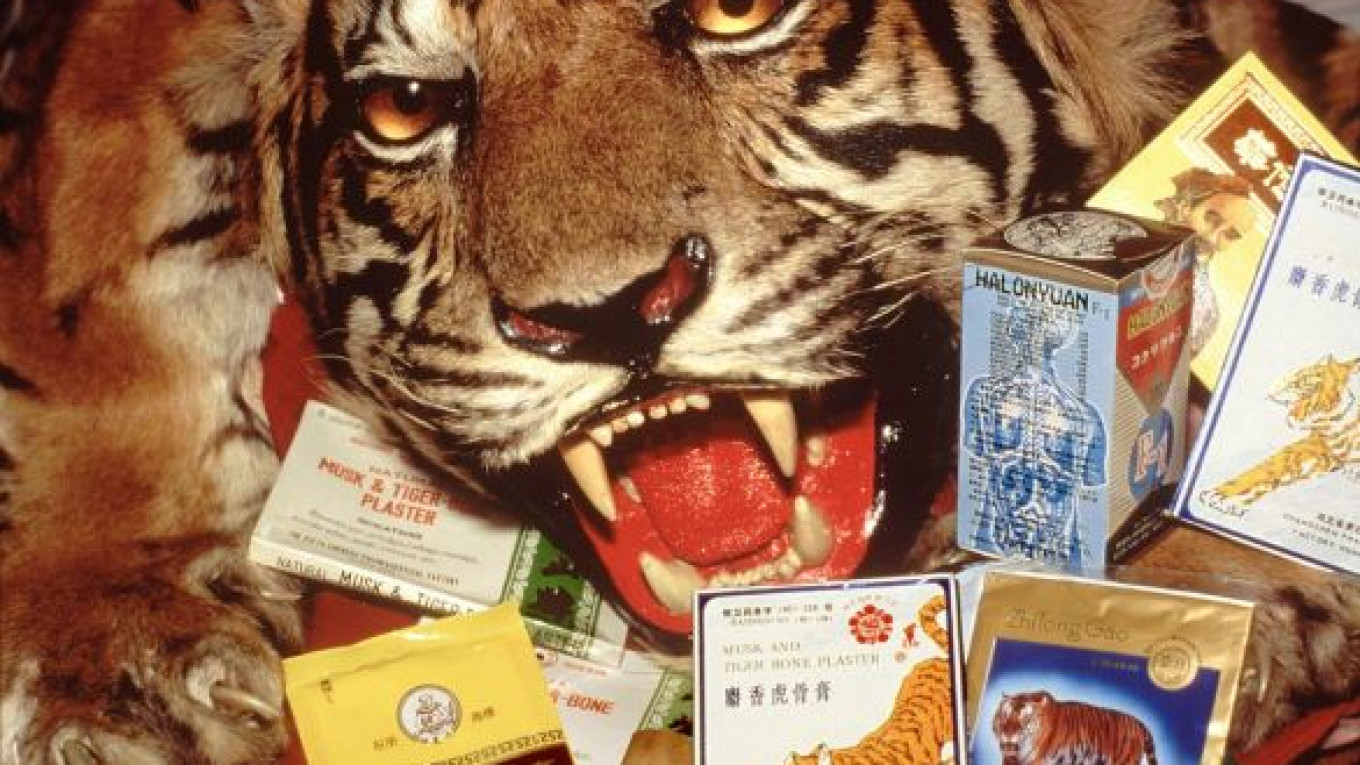Legislation to criminalize trafficking in endangered species or their body parts could be put before parliament as early as next summer, Deputy Natural Resources and Environment Minister Rinat Gizmatulin said earlier this week.
"The president's chief of staff has decided to draft a bill that basically boils down to this: the criminalization of all stages of handling endangered animals such as tigers, leopards and snow leopards, including illegal production, trade, sale, storage and transportation," Gizmatulin said at a press briefing.
Presidential Chief of Staff Sergei Ivanov said earlier that he wanted to criminalize trafficking in protected species, which is currently only an administrative offense.
The World Wildlife Fund Russia estimates that poachers kill 50 to 60 Amur tigers annually.
But estimates of the true extent of the trade in endangered species are hampered by a lack of data, said Vladimir Krever, of WWF Russia's biodiversity program.
"All we have to go on is the occasional arrest of a middleman selling, for example, tiger skins," Krever said. "A couple of recent arrests show that at least 18 tigers were killed in the last year or so."
Krever, who is part of a team helping to draft the bill, said it will probably be based on a list of species particularly threatened by poaching rather than every species listed in the Red Book.
"That's mostly those favored by Asian medicine, so big cats like the tiger, leopards and snow leopards; bears, which are valued for their paws and gall bladders; and musk deer, which are favored for their musk glands," said Alexei Vaisman of Traffic, an organization dedicated to fighting the trade.
Other candidates include the saiga antelope, a strange-looking beast that survives in Russia only in Buryatia, and large birds of prey like the gyrfalcon, which is valued in the Middle East for the high-status sport of hawking.
Like his boss, Vladimir Putin, Ivanov has a history of burnishing his image by standing up for endangered species. He was instrumental in pushing for creation of the Land of the Leopard National Park, a sanctuary for critically threatened Amur leopards that opened earlier this year in the Far East.
The Amur leopard is the most endangered big cat on the planet, with just 40 to 50 in the wild.
But environmentalists said Ivanov was simply endorsing a proposal they had been pushing for some time.
"It has been a matter of great pain for us that handling animals and body parts is not punished on the same level as killing them," Krever said.
While it is a criminal offense to kill Red Book-listed animals like the Amur tiger, poachers are rarely caught in the act.
Law enforcement officers are much more likely to catch the middlemen to whom poachers sell pelts and other body parts. Without evidence that a suspect killed the tiger himself, the top punishment for handling tiger pelts is a fine of just 2,000 rubles ($64), Vaisman said.
While poachers are usually individual hunters operating independently, some trafficking can be on a much larger scale. For example, it is not unusual to find shipments of up to 1,000 bear paws en route to China, Vaisman said.
Such operations are run by sophisticated gangs that straddle national borders and engage in organized crime, he said.
"At that level, it can be described only as organized," Vaisman said. "They will be on both sides of the border, and often police officers and customs officials are involved. They need refrigerators and access to preservatives to make it work. They are specialized and quick."
Environmentalists consulting on the bill, including Vaisman and Krever, want the new law to punish people involved in the trade of endangered species as if they were trafficking drugs.
The purchase, possession, transportation, manufacture or processing of narcotics carries a maximum sentence of 10 years under Russian law.
Experts from the WWF and Traffic are guiding the legislation through a long and complex process, which Krever hopes will be complete by next summer.
Enforcing the law is another question, however. There are only about 170 rangers to patrol the Amur tiger's range in the Primorye and Khabarovsk regions. That's down from a peak of 1,700 some years ago.
Two white gyrfalcons rescued from smugglers flying to the United Arab Emirates at Domodedovo Airport in 2010 will take up ceremonial duties at the Kremlin.
Natural Resources and Environment Minister Sergei Donskoi handed the two over to the commanding officer of the fortress at a ceremony Wednesday, the ministry said in a statement.
The two birds will take part in formal ceremonies at the Kremlin to highlight Russia's commitment "to the preservation of cultural and historical values and restoration of animal populations of special importance," Donskoi said.
Related articles:
A Message from The Moscow Times:
Dear readers,
We are facing unprecedented challenges. Russia's Prosecutor General's Office has designated The Moscow Times as an "undesirable" organization, criminalizing our work and putting our staff at risk of prosecution. This follows our earlier unjust labeling as a "foreign agent."
These actions are direct attempts to silence independent journalism in Russia. The authorities claim our work "discredits the decisions of the Russian leadership." We see things differently: we strive to provide accurate, unbiased reporting on Russia.
We, the journalists of The Moscow Times, refuse to be silenced. But to continue our work, we need your help.
Your support, no matter how small, makes a world of difference. If you can, please support us monthly starting from just $2. It's quick to set up, and every contribution makes a significant impact.
By supporting The Moscow Times, you're defending open, independent journalism in the face of repression. Thank you for standing with us.
Remind me later.






